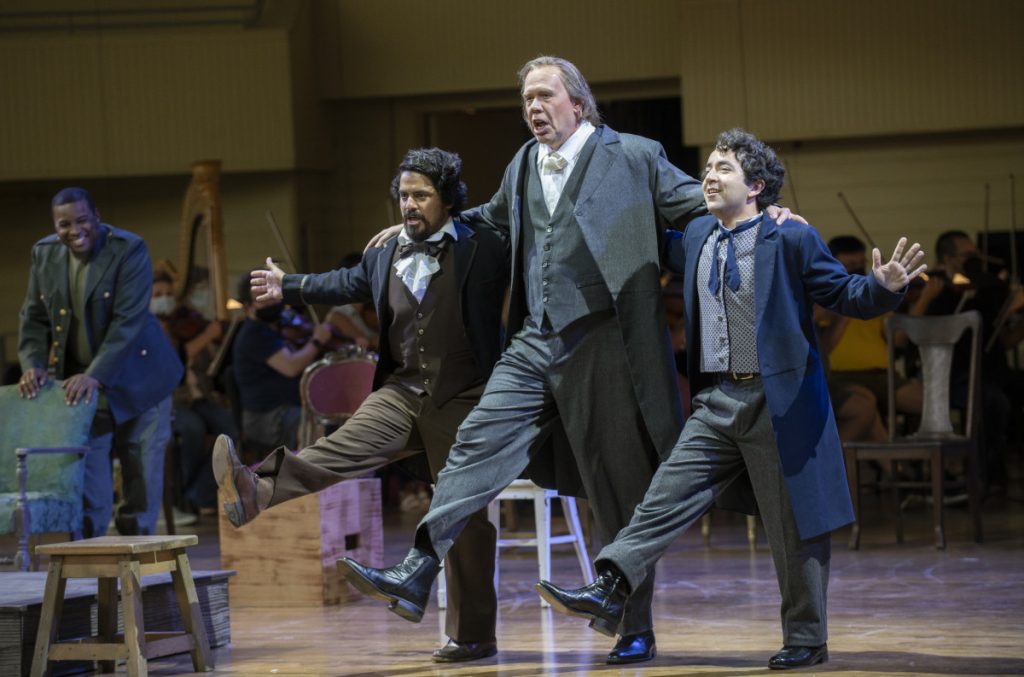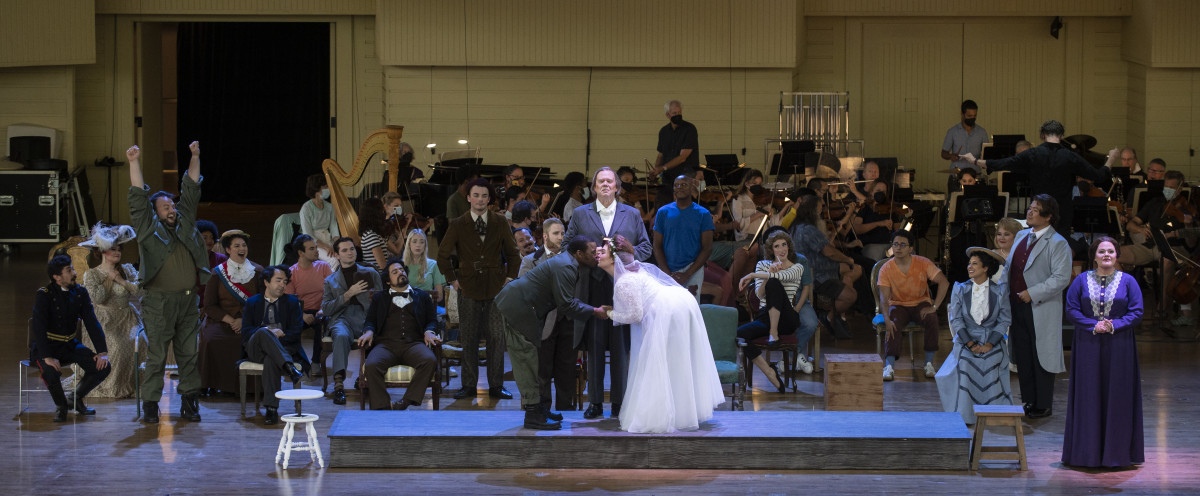Author Gertrude Stein was not afraid of repetition, and while this makes her work rich with literary merit, the script can pose a memorization issue for the cast of The Mother of Us All.
“Every word has to mean something, no matter what, but in this — particularly for memorization’s sake — if I don’t attach intention to every phrase, it falls apart,” said soprano Wendy Bryn Harmer.
Under the direction of Keturah Stickann and the baton of Chautauqua Opera Company’s General and Artistic Director Steven Osgood, composer Virgil Thomson and Stein’s The Mother of Us All, which follows Susan B. Anthony’s fight for women’s right to vote, is the third and final production in the Chautauqua Opera Company’s 2022 Opera Festival Weekend. The one and only time audience members can see this opera is at 8:15 p.m. Saturday, July 30, in the Amphitheater, the same location where Susan B. Anthony herself once spoke in 1891.

Stein wrote the libretto for two out of Thomson’s three operas that he composed in his lifetime.
Other than his operas, Thomson was a prolific classical composer, who also won a Pulitzer Prize for Music with his film score of “Louisiana Story” in 1949. Much like how Thomson is better known for his classical music than his opera composition, Stein is known as a novelist.
Stein grew up in Oakland, California, and eventually moved to Paris in the early 1900s. She spent the rest of her days there as an expatriate, hosting creatives in her salon such as F. Scott Fitzgerald, Henri Matisse, Pablo Picasso and Ernest Hemingway. Her most famous lines are “Rose is a rose is a rose is a rose” and “There is no there there.”
Much like most of Stein’s work, the opera The Mother of Us All is highly experimental. It contains real-life characters and intertwines them with fictional or fictionalized characters, with Guest Artist Harmer playing Anthony, alongside Guest Artists Chauncey Packer and Alan Held.
The opera debuted in Brander Matthews Hall at Columbia University in 1947, a year after Stein’s death. While its debut was 75 years ago, people feel that its message, and the theme of democracy, is more pressing than ever. This belief is reflected at Chautauqua — the opera closes the Week Five theme “The Vote and Democracy.”
Stein explores this important idea through her stylistic libretto. Osgood noted — as did Harmer — that Stein’s libretto is difficult to understand at times.
“The trick to The Mother of Us All is drawing people into the language, and the language of Gertrude Stein is often like a Picasso portrait in that — in the very same frame — you’re at the face, the body of a person from 18 different angles. And so that nose is from that perspective, and then that ear is from a completely different perspective. If you look at it as a whole, you go, ‘That face doesn’t make any sense,’ ” Osgood said.
When everything finally clicks, though, it shows the beauty of the language and the intensity of the message Stein wants to convey.
“And yet, when you look at it from all the different angles, you can see how it fits together, and then it is perfectly logical what Picasso did in that portrait. And that’s what Gertrude Stein does,” Osgood said.
Another aspect of the Stein’s language is her use of the word “negro” in the original libretto, which she wrote in 1945-1946. The character of Susan B. Anthony uses it when she is waking up from a dream, and while in a dream-like state, she sees her friend, who is a Black man, and addresses him with the words “Negro Man.”
“She knows the person she’s talking to. He has a name. I’ve called him by his name in the opera, but in this moment of ‘I don’t know if I’m awake or asleep,’ I immediately classify him,” Harmer said. “… I think they very intentionally used that word to say, even at our very best, we classify groups of people.”
Chautauqua Opera has decided to replace the phrase with “Black man.”
“In some ways, I think that I’m sorry we altered the text only because I think it is shocking to hear it. In another way, I’m glad we altered it because I think it will allow people to just hear the piece in general and not panic about, ‘Oh, you’re using a word that we wouldn’t,’ ” Harmer said.
Harmer does appreciate that Chautauqua Opera is taking on this piece, because she feels some companies would shy away from this untraditional opera.
“It’s a really complicated piece,” she said, “and at first glance, it just doesn’t make a lot of sense, and it seems almost absurdist.”
But she thinks Chautauqua is the perfect audience for this piece.
“They will have done their homework, and I think that’s something that most artists really love about Chautauqua is that you’re performing for an audience who wants to be here. They’re not just going because it’s a social event. … They’re curious about the subtext, they’re curious about the composer, they’re curious about what this really means,” she said.
Harmer believes people will leave the Amp thinking, as the opera continues to make her think. Because The Mother of Us All was supposed to be produced in 2020 to mark the centennial of the 19th Amendment, she has lived with this piece for almost three years.
“It leaves me with a sense of responsibility that I cannot be complacent,” she said.
With the delay of the opera because of COVID-19, the United States has lived through the 2020 presidential election, the Jan. 6 insurrection, and other historic events.
“In many ways, I think it’s going to be more profound and more impactful because of what has happened in the last two years in terms of the polarization of America,” Harmer said. “… Susan B., I think, was quite afraid of that happening. Afraid of polarization, maybe, but even more so afraid of complacency. Susan B. was very concerned that if women got the vote, what would they then do with it?”





